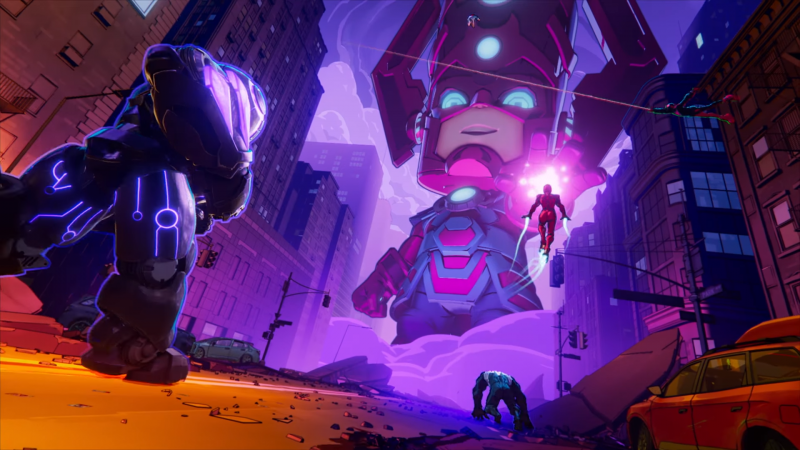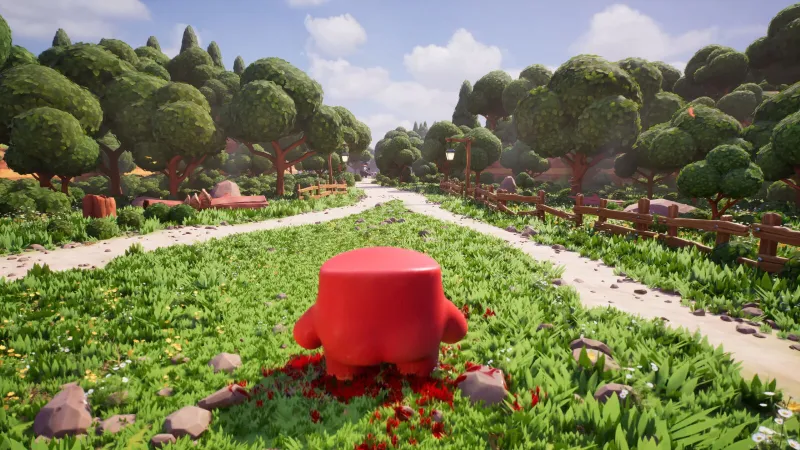
I’m extremely picky with my mobile games. Since its launch in 2019, Apple Arcade has spoiled me so thoroughly with its beautifully crafted, ad-free experience that it’s hard to go back to anything else. To my surprise, this month saw the release of a game that fits both of these criteria: Marvel Snap. I downloaded it a few days ago and haven’t put it down since. Marvel Snap is a free-to-play deck-builder with very short matches (usually only three to four minutes). As you play, you collect cards adorned with Marvel characters, each with a unique ability. Characters range from mainstream heroes like Hulk and Iron Man to ones I’ve never even heard of, like Ka-Zar or Blue Marvel. At only 12 cards, decks are relatively small, so every character counts. The app is named for the Snap mechanic, which allows you or your opponent to double down at any point during the match. If you win, you get twice the cubes, the currency you use to increase your competitive rank. If you snap and lose, your rank will decrease instead, creating a delicious risk/reward system. In a game, you play your cards at one of three iconic Marvel locations, each with a different gameplay modifier. For example, Kamar-Taj allows certain card abilities to trigger twice, Fisk Tower destroys any card that moves there, and the Gamma Lab turns every card into the Hulk. Between the dozens of locations and the vast number of cards, Marvel Snap has so many variables that much of the joy of playing comes from seeing what’s going to happen in any given match. I can never predict what will happen the next time I play, and that curiosity is what makes the game so engaging. Ka-Zar, one of my favorite cards in Marvel Snap, is a character I had never heard of before playing this game. These two main mechanics – the snap and the random locations – are how Marvel Snap sinks its hooks into me so deeply. It’s a game that relies on you to think two steps ahead; you have to plan according to the future locations, your opponent’s moves, and what cards you’ll draw from your deck, despite the fact that you can rarely know any of those factors. If you feel confident, you snap, raising the stakes. Maybe you even snap if you aren’t feeling confident, just to throw your opponent off their rhythm. It’s a guessing game, and when you come out the other side victorious, you feel like the smartest and/or luckiest player alive. If you’re not playing for the thrill of the procedurally generated hijinks, you’re playing for the seemingly endless reward loop. Every time you finish a match, you gain boosters, which basically function as experience points that level your cards up cosmetically. Get enough boosters, and your cards can increase in rarity, making them animated and 3D. Every time you evolve a card that way, you also increase your collection level, which is how you unlock new cards. There are also daily and weekly quests and a season pass full of rewards. Win or lose, it’s rare that the end of a match won’t leave you feeling rewarded in some way. That’s an impressive feat for any game, especially for a free mobile game. Marvel Snap can afford to be free-to-play because of its microtransactions, which are handled surprisingly well. The main reason you would spend money is to get card variants: copies of a card with a different art style. They’re mechanically identical to the base cards, so the only reason to buy them is if you’re interested in the aesthetic or if it’s a card you don’t have yet. You can get them through the store, which rotates daily, or through the $10 season pass, which allows you to level up through gameplay to get a whole spread of rewards. You can get new cards this way, but you really don’t need to. I’ve got a little under 10 hours in the game and I already have 55 cards. The variants in the current symbiote-themed season pass look cool, but I don’t think I’d get any particular strategic advantage by paying for them. This could theoretically change if the developers decided to put a new, broken card in the season pass, but card balance has been very consistent so far, so it seems unlikely. Even in the paid season pass, many rewards are free. One of the reasons it’s been so easy for me to stick with it is how unintrusive these in-app purchases have been. I’ve never felt any pressure to spend money, which is more than I can say for many other mobile titles. Marvel Snap isn’t designed to make you pay money to keep playing. It’s designed for you to enjoy playing so much that you eventually spend money. When I say I want more mobile games to feel like Marvel Snap, this is what I mean; truly optional monetization instead of using paywalls to make the game purposefully less convenient. I’m excited to see what changes and improvements future seasons will bring, but I’m still very impressed by how tight Marvel Snap’s gameplay loop is right at launch. I only intended to download the game for a quick peek but ended up engrossed in one of my favorite gaming experiences of the year, mobile or otherwise.
I’m extremely picky with my mobile games. Since its launch in 2019, Apple Arcade has spoiled me so thoroughly with its beautifully crafted, ad-free experience that it’s hard to go back to anything else. To my surprise, this month saw the release of a game that fits both of these criteria: Marvel Snap. I downloaded it a few days ago and haven’t put it down since.
Marvel Snap is a free-to-play deck-builder with very short matches (usually only three to four minutes). As you play, you collect cards adorned with Marvel characters, each with a unique ability. Characters range from mainstream heroes like Hulk and Iron Man to ones I’ve never even heard of, like Ka-Zar or Blue Marvel. At only 12 cards, decks are relatively small, so every character counts. The app is named for the Snap mechanic, which allows you or your opponent to double down at any point during the match. If you win, you get twice the cubes, the currency you use to increase your competitive rank. If you snap and lose, your rank will decrease instead, creating a delicious risk/reward system.
In a game, you play your cards at one of three iconic Marvel locations, each with a different gameplay modifier. For example, Kamar-Taj allows certain card abilities to trigger twice, Fisk Tower destroys any card that moves there, and the Gamma Lab turns every card into the Hulk. Between the dozens of locations and the vast number of cards, Marvel Snap has so many variables that much of the joy of playing comes from seeing what’s going to happen in any given match. I can never predict what will happen the next time I play, and that curiosity is what makes the game so engaging.
Ka-Zar, one of my favorite cards in Marvel Snap, is a character I had never heard of before playing this game.
These two main mechanics – the snap and the random locations – are how Marvel Snap sinks its hooks into me so deeply. It’s a game that relies on you to think two steps ahead; you have to plan according to the future locations, your opponent’s moves, and what cards you’ll draw from your deck, despite the fact that you can rarely know any of those factors. If you feel confident, you snap, raising the stakes. Maybe you even snap if you aren’t feeling confident, just to throw your opponent off their rhythm. It’s a guessing game, and when you come out the other side victorious, you feel like the smartest and/or luckiest player alive.
If you’re not playing for the thrill of the procedurally generated hijinks, you’re playing for the seemingly endless reward loop. Every time you finish a match, you gain boosters, which basically function as experience points that level your cards up cosmetically. Get enough boosters, and your cards can increase in rarity, making them animated and 3D. Every time you evolve a card that way, you also increase your collection level, which is how you unlock new cards. There are also daily and weekly quests and a season pass full of rewards. Win or lose, it’s rare that the end of a match won’t leave you feeling rewarded in some way. That’s an impressive feat for any game, especially for a free mobile game.
Marvel Snap can afford to be free-to-play because of its microtransactions, which are handled surprisingly well. The main reason you would spend money is to get card variants: copies of a card with a different art style. They’re mechanically identical to the base cards, so the only reason to buy them is if you’re interested in the aesthetic or if it’s a card you don’t have yet. You can get them through the store, which rotates daily, or through the $10 season pass, which allows you to level up through gameplay to get a whole spread of rewards. You can get new cards this way, but you really don’t need to. I’ve got a little under 10 hours in the game and I already have 55 cards. The variants in the current symbiote-themed season pass look cool, but I don’t think I’d get any particular strategic advantage by paying for them. This could theoretically change if the developers decided to put a new, broken card in the season pass, but card balance has been very consistent so far, so it seems unlikely.
Even in the paid season pass, many rewards are free.
One of the reasons it’s been so easy for me to stick with it is how unintrusive these in-app purchases have been. I’ve never felt any pressure to spend money, which is more than I can say for many other mobile titles. Marvel Snap isn’t designed to make you pay money to keep playing. It’s designed for you to enjoy playing so much that you eventually spend money. When I say I want more mobile games to feel like Marvel Snap, this is what I mean; truly optional monetization instead of using paywalls to make the game purposefully less convenient.
I’m excited to see what changes and improvements future seasons will bring, but I’m still very impressed by how tight Marvel Snap’s gameplay loop is right at launch. I only intended to download the game for a quick peek but ended up engrossed in one of my favorite gaming experiences of the year, mobile or otherwise.



